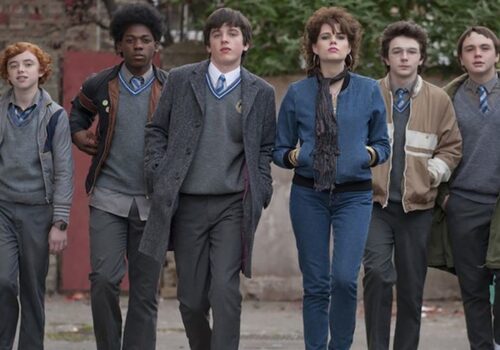Inside Ireland’s Youth Loneliness Epidemic
Words: Izzy Copestake
Image: Enda Bowe, (Normal People, BBC)
Ireland is the loneliest country in the EU, and it’s Ireland’s youth who are suffering the consequences.
Lonely: a word usually associated with heartbreak, physical isolation, or old age. Not youth. We’re told youth is the freedom to fuck up a bit, fall in love, take risks, and ultimately use the precious time available with your mates before the responsibility of real adulthood sets in. Think Friends, or literally any Richard Curtis film where an inseparable gang of 20-somethings muddle from day-to-day, or relationship-to-relationship, without the price of simply getting by standing in their way. This ideal of youth, sold to us by pop culture and the nostalgia of older generations, has become just that: an ideal.
An EU study published this year found that young people are more at risk of loneliness than the elderly, with Ireland being the loneliest country overall. One in five people in Ireland feel this way, compared to the European average of 13%. Looking at the country in 2023, can we be entirely surprised? The euphoric chaos and connection attributed to youth seems like a distant hazy dream in the current economic climate, especially as socialising with your mates can mean watching in utter horror as €6.50 exits your account for a single pint of Guinness.
‘Would you like to head back to my place?’ – a sign of a successful date. At least, maybe in a country with a more forgiving rental economy than Ireland. According to Eurostat, 68% of adults in their late 20s still live in their parents’ homes. Spoiler: It’s not because everyone can’t get enough of their parents’ company. Dublin is one of the most expensive cities in the European Union for rent, with an average of €2,300 per month. Suddenly, the walls feel very thin, and the prospect of a post-ride Weetabix becomes a minefield of awkward eye contact and, ‘So when were you going to introduce us to this lovely lad?‘ Fionnuala* is 23 and unable to move out of her parents house in Dublin. ‘If I have a prospective date but they also live at home with their parents, I just don’t bother. There’s no way we can spend time alone and get to know each other, It’d be so uncomfortable doing that around my entire family.’ Fionnuala is not alone. In fact, 7 out of 10 Irish daters surveyed by Bumble stated that dating was more difficult while living with their parents, and 39% went as far as saying it was a turn-off.
The issue of ‘your place or mine’ only applies if you can actually afford to go on a date, and the current cost of living crisis is testing that. Ireland is the most expensive country to live in in the EU, with general prices in Ireland being 46% above the EU average, and alcohol priced at a whopping 116% above average. Part of the fun of a first date it not knowing how it’s going to go: maybe you’ll spend the rest of your life with this person… or perhaps it will become a harrowing anecdote you tell to cheer up a mate in a couple of months time. Considering the cost of going out, some simply cannot afford to take this risk. ‘The cost of living has forced me to choose between having fun and eating,’ 23 year old Tom* tells District. ‘It’s happened to me a couple of times, that to actually take someone out for drinks or food, or something sweet like that, would’ve put me on dire straights for the rest of the week.’
Love life aside, the cost of simply surviving in Ireland as a young person has threatened the most basic relief from loneliness: meeting up with friends. With many getting a second job, and others simply not having the funds to agree to an expensive pint or €4 flat white in town, the basic need to socialise has become a luxury many people cannot afford, or simply do not have the time to spare. Yes, there are free activities, but with so many people living in their parents homes and Ireland now entering the depths of winter, ask yourself: would you go for a lockdown-style baltic can in Phoenix Park just to see a mate?
“It’s very had to search for someone who’s warm and funny and spontaneous… you’re searching for someone who’s tall, or not, or 18-24, or lives in Mayo.”
Cyberpsychologist Dr Nicola Fox Hamilton on online dating
Naturally, this means many people are staying in touch with their mates or dating via the only feasible free option out there: online. Speaking about the rise of online dating cyberpsychologist Dr. Nicola Fox Hamilton says the the seemingly large number of options available doesn’t actually fix the problem. ‘Actually, the research on the psychology of choices and decision making shows that having fewer options is actually better. We tend to be happier with our decisions, we think less about the trade-offs we had to make to make this decision. So 6 to 8 choices is actually the ideal, and when you think about something like Tinder, you have hundreds of choices. People end up seeing so many options and thinking, there might be somebody even better.’
Unsurprisingly, this kind of dating has become infiltrated by the very thing that pushed people out of in-person dating and into the digital sphere: the economy. ‘This can also bring with it a shopping mentality, a consumer mentality, about yourself as well as other people. You can start looking at people with a checkbox list, a lot of the time you search for people on a dating site, it isn’t about these characteristics. It’s very hard to search for someone who’s warm and funny and spontaneous… you’re searching for someone who’s tall, or not, or 18-24, or lives in Mayo.’
Technology can make dating weird, but according to Dr. Fox Hamilton, phones aren’t the problem. ‘There is no evidence to suggest that social media is causing loneliness. But what we do know is that sometimes when people are using social media to alleviate loneliness, it can turn into problematic use.’ While Dr. Fox Hamilton points out that there are many positive online communities that can foster genuine connection, it’s important to know when to take a step back. ‘It’s sometimes better to seek friends outside of that online space.’
But what happens when your world outside that online space is tiny? Ireland has one of the lowest population densities in Europe, so for those living out in the country, physical isolation can be a part of growing up. ‘Being unable to drive leaves you extremely isolated even from nearby towns, so the only option for socialising you have are the 60 or so people in the adjacent years to you in school,’ 22 year old David* tells District. But for David*, the physical isolation of rural Ireland was just one aspect of the isolation he experienced. ‘Being part of an ethnic minority is interesting because it was so uncommon there, people are almost accidentally racist. You’re definitely seen as an outsider and although I had a large basis of friends by the end of my time in rural Ireland, people were definitely wary of me for the first few years. There is no alternative and no ability to find your people as well as just no facilities to foster passions which may be considered less common in rural Ireland.’
The impact of an upbringing characterised by physical isolation can follow you, even after moving away for college. The heavy financial load this imposes, coupled with little or no foundation of school friends to rely on once the move is made, can make things tough. ‘I think the unique Irish culture of staying quite tethered to home whilst being in college also contributes to a struggle because people rely on their friendships from school a lot more.’
The growing number of lonely young people in Ireland is sad, but it’s also dangerous. The impact of chronic loneliness is thought to be worse for our health than smoking 15 cigarettes a day. It’s linked to dementia, cardiovascular disease, a short life span, and more obviously, depression and anxiety. What’s worse, is that over 1/4 of people feel shame about their loneliness. The stigma attached to feeling this during youth can exasperate the problem, forcing young people at risk to isolate themselves further. It’s deeply painful and physically unhealthy, but it’s also not your fault. Ireland’s youth loneliness epidemic has been festering for years, and as the cost of living soars, its reached crisis point
*Names have been changed







